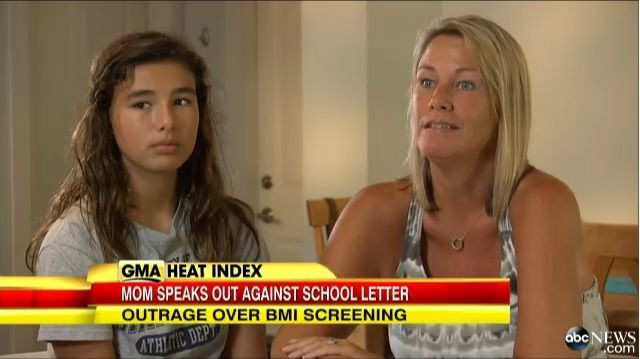
Kristen and Michael Grasso are two Florida parents that got the surprise of their lifetime when they received a “fat letter” from the Collier County Health Department in Naples, warning them their daughter, Lily, was at risk of becoming obese. At least 21 states in the U.S. have laws requiring students to get health screenings, including a Body Mass Index test (BMI) at the start of the school year as an effort to combat the childhood obesity epidemic. Florida is one of those states. However, 11-year-old Lily is a 5-foot-5, 124 lbs. girl that is very athletic and active. "Lily is athletic, tall, plays volleyball six days a week for two different teams. She's not overweight," her mother said.
The school fat letter upset Kristen Grasso because she thought it would really hurt kids who weren't "fat" but more athletically built -- like her daughter. "To give a kid a letter telling them the rest of their life they may be overweight or be obese because of a measurement you took one day, it's just not fair," she said. Grasso added that she was concerned for "kids who see the results of this test [who] may be classified as overweight but aren't, and the self-esteem issues that they may get." Lynn Grefe, president and CEO of the National Eating Disorders Association, added, "I would like to see BMI testing in schools banned. For those who are already insecure about their weight, these tests can . . . potentially trigger an eating disorder."
However, Deb Millsap, with the county health department, stands behind these tests and said that all parents receive a letter about their child's BMI. She said the letter includes a caveat that the BMI test could be off for athletic kids and urges parents to follow up with their family doctor. "We always want parents to realize that it says so in a letter, and it's only a screening tool," Millsap said. "Every parent, (even) if a child's screening is normal, receives a letter so no child is singled out."
Obesity expert Dr. Rexford Ahima of the University of Pennsylvania told Yahoo Shine that BMI is the best, least costly tool available to identify at-risk children and is great for public health screenings. However, it doesn't distinguish factors such as gender, age, and ethnicity that may affect the result and human error might also throw off the numbers. In Lily's case, the school reported her height to be 5-foot-3 and weight to be 124 pounds, with a BMI of 22. Her mother says she's 5-foot-5, which puts her in the healthy range for children. Ahima also pointed out that BMI doesn't measure body fat versus muscle mass. "The intention to use it as a guide is OK, but in order to evaluate the information on an individual basis, then the child's physician should be involved," he said.
Kristen said she encourages her children to eat healthy and live an active lifestyle. As for Lily, she told ABC she was not going to let the letter get to her. Her plan, she said, was to "Be confident in everything that I do and never give up."
© 2025 Latin Times. All rights reserved. Do not reproduce without permission.





